2008 Sejong Music Composition Competition
Winners
Some winning pieces may be found in our Music Competition Repertoire Book. Please check our Music Competition repertoire page for more details.
| First Place | Eun-ho Chang (장은호) Daegu, South Korea Sanjo for violin solo |
|---|---|
| Second Place | In Won Kang (강인원) Seoul, South Korea Baet Norae: Barcarolle for cello solo |
| Third Place | Misook Kim Naperville, IL, USA JOY of Ong-He-Ya for violin solo |
| Honorable Mention | Inhwa Song (송인화) Daegu, South Korea Parangsae for piano solo |
| Heeyoung Yang (양회영) Cincinnati, OH, USA Milyang for piano solo |
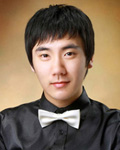
Eun-ho Chang was born in Daegu in 1983. He studied composition at the Kyongbook High School of Art in Daegu. Since 2002, he has been studying with full scholarship at the Keimyung-Chopin Academy of Music in Daegu, where his professors include Zbigniew Rudziński, Edward Sielicki, Marcin Błażewicz and Miłosz Bembinow among others.
Eun-ho has also won several prizes at domestic competitions, including first place at the Keimyung University General Music Competition in 2001, while he was still a high school student.
Eun-ho's compositions cover a variety of genres, including solo, chamber, vocal, and orchestral pieces. His music style is mainly based on a blend of Eastern and Western music.
A regular performer, Eun-ho Chang is a regular piano accompanist and also a member of many chamber ensembles. Recently he performed at the Keimyun-Chopin Academy of Music's "Big Concerts," "Fresh Green's Concerts," as well as the cycle of "02" concerts for young musicians and audiences.
As a sanjo is traditionally a solo performance piece, originally written to demonstrate the virtuosity or techniques of Korean traditional instruments, "Sanjo" is a solo piece written for violin. Written in an A-B-A format, the middle section (b) was composed with a theme from the folk song "Ong-He-Ya," accompanied with variations on the rhythm and melody. It eventually builds up into a dramatic climax before returning to the original theme of the piece.
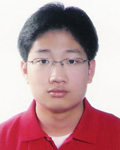
In Won Kang began studying music composition at the Korean National University of Art Preparatory School, where his teachers included Sungho Whang, Younghee Yoo, and Sung-Ghi Kim. In 2006, Mr. Kang won first place in the high school division at the Choon-Chu Music Competition. After studying gayageum at Guk-Ak High School, he graduated in 2007 and went on to continue his studies in music composition at the Korean National University of the Arts. He is currently a student of Professor Byung Eun Yoo. Using his strong background in Korean cultural music, he plans to continue composing music with traditional Korean themes.
"Baet-Norae: Barcarolle," for cello and piano, is based on a folk tune from the Kyung Sang province. The cello's melody is accompanied by a piano part written to resemble a janggu - a Korean percussion instrument frequently used to accompany a solo instrumentalist or singer. The rhythm of the melody is styled on the traditional geut-geo-ri rhythm, with variations in different styles, such as the jajin-mori, ut-mori, and dan-mori rhythm patterns.
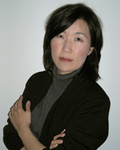
Misook Kim received her B.A. with the honor of Cum Laude from Seoul National University, Seoul, Korea. After finishing her "New Star Concert" sponsored by the Cho-sun Newspaper, she entered the graduate school at the University of Texas at Austin where she completed her M.M. and D.M.A. degrees in composition and the certificate of piano performance.
Reviewer Mike Greenberg, writing in the San Antonio Express-News, called the composer 'a bold and unrepentant modernist'. He also has mentioned 'each of her works presented thus far has impressed with its fearless modernism, its concision and its strong individual profile'. Kim has performed as a composer as well as a pianist in various concerts of her own works from solo to larger ensemble compositions throughout the States and Korea.
Including commissions for the MUSICOPIA Concert, Olmos Ensemble, she has won International Alliance for Women in Music (IAWM) Judith Zaimont Award and the Long Island Arts Council International Composition Competition in 2007. She was a former faculty member at The University of the Incarnate Word and Trinity University in San Antonio, TX. She had also served as a music director at KUMC. In Fall 2006, Kim joined the faculty at the Conservatory of Music at Wheaton College, IL.
"JOY of Ong-He-Ya" (2008) is based on the Korean traditional folk tune, 'Pori-Tajak Sori', barley threshing song from Kyung-Sang Province. The thematic elements are derived from the simple interval of a major 2nd, minor/major 3rd and perfect 4th. These two short motivic ideas, 'Ong-He-Ya' and 'Uh-Jul-Shi-Gu', keep repeating and developing as a call and response between violin and piano.
A delightful rhythmic motif personifying Korean traditional folk-tune in different registers and instruments. Throughout the piece this simple and clear musical material interacts with a happy theme, representing the joyful and exciting Korean folk song.
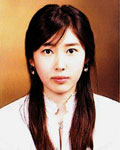
Inhwa Song was born in Kwangju, Korea, in 1986. After showing great interest in music from a young age, she began studying music composition while attending Junghwa Girls' High School in Daegu, Korea. As a student at Junghwa, she won prizes from several local music composition competitions. Currently she is a fourth-year music composition major at the Keimyung University in Daegu, Korea. Recently Ms. Song has presented her music in several music composition recitals in Daegu, Seoul, and Japan.
"Parangsae," (literally "bluebird") for piano solo, is based upon the traditional folk song "Sae-Ya, Sae-Ya," or "Birds, Birds," and divided into two parts.
The first part is a mix of contemporary music and Korean traditional styles. It begins with an F, Bb, C three-tone scale, followed by a Bb, C, D, E, F#, G# six-tone whole tonal scale. The piano accompaniment uses a traditional jajin-mori rhythm and takes its melody from abstracting parts of "Sae-Ya, Sae-Ya."
The second part uses a contrasting rhythm against the first by emphasizing emotional and melodic styles and through utilizing different counterpoints.
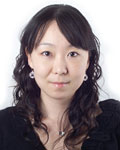
Heeyoung Yang, born in Korea, began her studies in music composition with Eunyoung Kwak at Sunwha Art School in 1991 and earned her Bachelor's Degree from the Yonsei University in Seoul, Korea (Summa Cum Laude). She holds a M.M. in composition from the graduate school of Yonsei University where she studies with Chan Hae Lee and from College-Conservatory of Music, University of Cincinnati where she studied with Joel Hoffman.
Her pieces, GAME for four cellos and Soliloquy were performed in Summer Music Festival Music 05 and Music 06 in Cincinnati. She had a solo recital at Cohen Family Studio Theater in 2006. In the same year her pieces were performed in Croatia and France. She is also active in Christian choral music offering various pieces in Churches in Cincinnati area. She is currently working toward her doctoral degree with Joel Hoffman at College-Conservatory of Music, University of Cincinnati.
"Milyang," for piano solo.
This music is comprised with introduction and five variations and a main theme. It is based on the folk song Milyang Arirang. Instead of using a traditional variation format, "Milyang" uses a free variation format.
As it was composed for pre-college students, the variations are simple and basic. The theme expands through a repetitive pattern and develops into a variety of harmonic patterns. Notation utilizes an extra five lines for the melody in order to make it easier to understand. Unlike other variation pieces, this music presents the main theme at the end in an attempt to increase expectation and induce one's imagination as the audience listens to the entire piece from the introduction and its five variations.